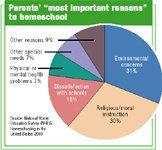What you need to learn about homeschooling
Effective health care for the homeschooled child requires understanding of the issues, an open line of communication to parents, and the vigilance to ensure that children not covered by the safety net of school screening get the care they need.
DR. ABBOTT is a pediatrician in private practice in Berkeley and Orinda, Calif.; clinical professor of pediatrics at the University ofCalifornia San Francisco School of Medicine, and attending physician at Children’s Hospital and Research Center Oakland (Calif.)DR. MILLER is attending physician at Children’s Hospital and Research Center Oakland.The authors have nothing to disclose in regard to affiliations with, or financial interests in, any organization that may have an interestin any part of this article.

The American Academy of Pediatrics (AAP) makes no recommendation about homeschooling for normal, healthy children; it addresses the issue only with regard to children who are medically unable to attend school. The AAP states that "all school-aged children are entitled to obtain their education in a school setting..." based on both legal mandates and the "social and developmental advantages the school setting provides all children, including those with special needs."4

The 2003 NHES survey was based on interviews with parents of students between 5 and 17 years of age. Of the 11,994 children included in the study, 239 were homeschooled-a 29% increase from the 1999 survey ("Homeschooling in the United States: 1999")-and a rise in the homeschooling rate from 1.7% in 1999 to 2.2% in 2003.5,6
The survey asked parents to identify all the reasons they chose homeschooling and also state the most important reason. Parents often gave multiple reasons, including:
When parents were asked to state the single most important reason for homeschooling, the reasons they gave most often were environmental concerns (31.2%) and a desire to provide religious and moral instruction (29.8%) (see the figure, above). The National Center for Education Statistics plans to collect and report data about homeschooled students every four years, with the next survey scheduled for 2007.
Many of the 2003 survey findings about student and family characteristics paralleled the findings of the 1999 survey: